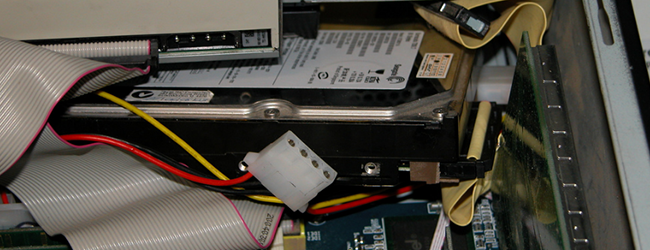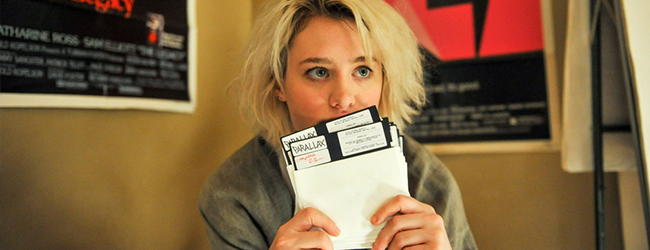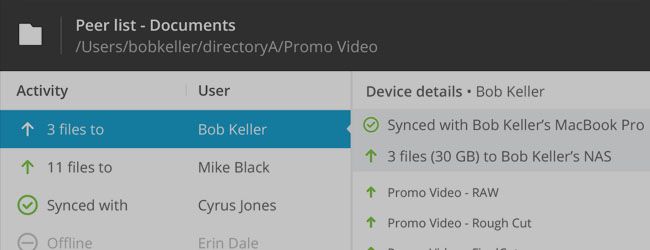Quick Links
The thing about catastrophic data loss is that it's difficult to picture it happening to you...until it does. You've probably rolled your eyes at a hundred articles just like this, and assumed you'd be okay, or you'll get to it eventually. Before you scroll past this one too, give me a chance to explain why you should, back up your photos, documents, and creative work right this minute-- and how to do it the right way.
Computers Fail (Often)
We have been sold silly stories about computers our whole lives. From the moment when the first Macintosh spoke to us in 1984, it's been popular to inject personality into computing to make them more approachable and appear less like the grumpy calculators that they are.
But in reality, computers are simple number crunchers made from parts built on the cheap. Computers fail regularly, and at best, should be looked at as a temporary island your data lives on, as it hops from place to place throughout your (much longer) life.
You probably know that hard drives can fail at any time, and maybe you even copy important files to an external drive once in a while--but this isn't a very effective backup. External drives can fail too, and true backups require multiple copies, so that when something goes wrong, you can revert to the most recent time things went right. Plus, if you're manually backing up your files, let's be serious: it's easy to forget, or get lazy, and before you know it six months have passed before you last backed things up. That's not good.
Part of my professional working day, I am an IT manager at a creative art company, and I oversee the storage and transfer of some 6TB of art files. Thankfully, only my own work has been lost because I was sloppy about my own backup, keeping it only on a single external USB hard disk. I have seen drives fail repeatedly for no reason, and only my neurotic commitment to backup has saved us from quiet catastrophe.
The first point you should understand is that one day, you will lose data. Everyone does at some point. And once it's gone, the computer doesn't care if it's gone forever. If you don't back it up properly, you'll literally never see it again, because it barely even existed in the first place.
While it is not impossible to recover data from a broken hard disk, data recovery and data forensics are quite expensive, and cannot guarantee perfect data recovery. Paying for a decent backup service is much, much cheaper.
Computers Can Be Used for Evil
If you've not heard the term ransomware, as a responsible citizen of the internet, it's my duty to inform you it's the scariest thing I can think of. Ransomware is a virus that takes quiet control of your computer and turns all of your important files into unreadable gibberish, leaving you with no way to turn it back into readable files. Then, a bunch of faraway for-profit malware-criminals will blackmail you into paying them to get your files back--and even then, they may not give them back (these are criminals, after all).
This may sound like sci-fi nonsense, but I assure you, it has happened to people close to me. Luckily, it happened within hours of performing a backup, but it's happened to plenty that didn't have that luxury. If the numbers on ransomware don't scare you, understand it affects real people. This Radiolab episode below does an excellent job of humanizing this, and it's well worth a listen. I get chills when I hear it... and then I double check my backup solutions.
Computers Do Everything You Tell Them To, Even If It's Stupid
Something even scarier---there's yet another threat to your data with a lot more direct access to your PC than any hacker in the world. That threat...is you.
Don't tell us you haven't done it! We've all been there. Maybe you accidentally put some important documents in the Recycling Bin, or deleted what we thought was an extra copy of that important photo and emptied the Trash, only to find that file was---oops---gone forever. And all the anti-virus software in the world isn't going to save you from your own silliness. Once that file is deleted, it's pretty much gone forever (unless you're really, really lucky).
The takeaway here? You can never expect when you'll lose data. Not only could hardware failure or malware strike at any moment, but you--no matter how careful you are--could goof something up, and your computer will follow your instructions, because that's what they're built to do.
Are you now appropriately aware of what a delicate thread your life's work is hanging by? Good. Now let's strengthen those threads and learn to do a proper backup.
Backup Is as Simple as 3, 2, 1
I have seen creative friends make copies of their artwork on external drives, only to delete them on their desktop machines. I repeat: manually copying files to an external drive is definitely not backup. RAID is not backup. Copying your files to SD cards are not backup. Backup is one thing, and one thing only: data redundancy on separate kinds of media, one of which is ideally in the cloud.
The 3--2--1 rule is simple to remember, and every person that lives and dies by their data should commit it to memory right now.
- Keep 3 copies of anything you care about.
- Use at least 2 kinds of media.
- Keep 1 copy in an entirely different location than the other two.
Luckily, you can accomplish the last two in one fell swoop with a program like CrashPlan. With it, you can back up to an external drive and the cloud, for a very reasonable price. You'll have two backups, one in a completely different location (so you don't lose data to a fire in your house), and after you set it up, you never have to think about it again. Seriously, it'll take you 15 minutes of your time, and it's our favorite app for dead simple backup.
If you only have a few files to back up--and you're absolutely sure that's all you need--you can also get away with a free or even cheaper cloud syncing service like Dropbox, Google Drive, or OneDrive. And if you're the "chop your own wood" type of geek, you can literally build your own cloud storage, although the price of remote VM storage isn't any cheaper than any of the services listed above.
If you have a ridiculous amount of data to back up in the cloud (greater than a terabyte, as I have), you might even look into Amazon Glacier, which stores files on drives to be accessed infrequently. It doesn't work like sync, but it would be a semi-permanent way to create backups once or twice a year of a large amount of data, and the price per GB is very affordable compared to Google Drive, Carbonite, or other similar cloud sync services.
Don't Wait Until Something Bad Happens
It only takes seconds to lose everything you value on your computer, but thankfully, backing up everything doesn't take forever and can be very cheap. Your data is very easy to lose, with malware, hardware failure, and general stupidity lurking around every corner--and once it's gone, it's gone forever.
Take this information, implement the 3-2-1 rule with your own files--and seriously, go back up right now.
Image Credit: Melondinosaur on Flickr, David Freeman on Flickr, Halt and Catch Fire by AMC, Lex McKee on Flickr, Santi on Flickr









